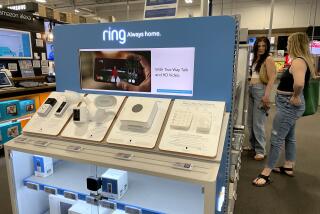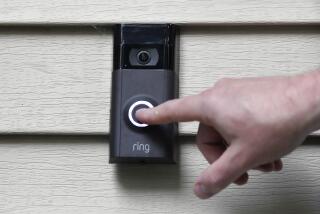Basics Are Back in Vogue : Few Electronic Breakthroughs at Consumer Show
- Share via
CHICAGO — Geoff Farrer wandered the aisles of McCormick Place last weekend scanning the thousands of electronic appliances and gadgets crammed into the cavernous convention center. And he couldn’t find anything new.
“There’s nothing we haven’t seen or heard about before,” complained Farrer, a Brea telecommunications consultant. “No new technology. No new products. Nothing.”
But with the all-important Christmas season ordering period well under way, the 1,400 or so manufacturers at the semi-annual Consumer Electronics Show had to have something to offer anxious retailers looking to rescue a dismal year.
So, it was back to basics--souped-up, gussied-up basics. Bigger, brighter, clearer televisions. Smaller, more powerful camcorders, copying machines and facsimile transmitters. Dressed-up telephones and radios. And dozens of new video games, the fastest-growing segment of the consumer electronics products on today’s market.
Consider, for example, the latest wrinkle in portable radio-cassette players: the stereo jacket. This technological breakthrough is coming from at least two manufacturers.
Toshiba Corp.’s offering, the $180 Sonic Jacket, has four-speakers--two on the chest, two on the shoulders--with a pocket for the radio and battery pack under the lapel. The price doesn’t include the radio-cassette player, but at least you don’t have to carry it anymore. The wires can be removed for washing.
For the more budget-minded, Sport Electronics, a small mom-and-pop outfit in Northbrook, Ill., offers a $50-$60 product line, Stereo Sweats. Here, the stereo pack zips into the lining of a hooded fleece jacket for while-you-jog entertainment.
On the phone front, manufacturers offered their usual plethora of telephones posing as stuffed animals, cartoon characters, beer cans and other domestic objets d’art.
But drawing the most visitor attention was Tyco Industries’ new model, the Super Block phone, built from dozens of interlocking colored blocks, the same sort of blocks that preschoolers enjoy. Tyco is aiming the $50 product at telephone users given to doodling while talking. A small drawer under the phone contains 18 extra blocks for absent-minded building.
No doubt 1988 will be remembered as the year the lowly telephone coil went designer. Two California companies have introduced a variety of colored and decorated coils for a quick, low-budget phone face-lift.
Fun Products of Berkeley, whose founders used to market Swatch wrist watches, is offering about 10 brightly colored and patterned 25-foot coils for about $13 each. The trendy designs and vibrant colors are reminiscent of the popular watches.
ATI Supply of Westlake Village goes a step beyond the colors and patterns with coils that can be customed designed for businesses, schools, clubs and other promotional events. Early customers include several colleges, which have placed orders for coils in their school colors. ATI sees a great potential for businesses to order custom-designed coils as gifts for their employees and customers.
The home office got even more attention this year with portable facsimile machines and lightweight copiers to team up with cellular telephones and laptop computers.
But a popular joke going around the convention was that a home was no longer a necessary component of the so-called home office. “You can work from a park bench or a car now,” said Joel Barnehama, president of Medbar Enterprises of New York.
Medbar introduced its latest portable facsimile machine, the PortaFax II, a system that needs only a battery pack to send or receive documents. The $2,000 system can operate over standard and cellular telephones.
Sharp Electronics, the Japanese giant, showed a sleek desktop system combining a telephone with a facsimile transmitter and receiver that is scheduled to retail in the same price range.
Among the more popular emerging product lines were small “personal copiers,” from the likes of Sharp, Canon USA and Ricoh Corp. Personal copiers, whose prices range from $1,000 to $2,000, are considered among the fastest-growing segments of the home office market.
For the traveling worker or the harried, errand-running housewife, Psion Inc. of Watertown, Conn., has the Organizer, a hand-held computer designed to keep track of appointments, telephone numbers, reminders, notes, expense reports and anything else its owner wants to store.
The tiny, half-pound device works with telephone modems to transmit information to central computers and it can be outfitted with special battery-sized programs for spreadsheet calculations, spelling checking and traveling abroad. The device, which was recently introduced at U.S. department stores, retails for $250 to $270. For video game manufacturers, 1988 promises to be bittersweet. While the makers are projecting tremendous sales gains over last year, they say their growth is being seriously constrained by the continuing shortage of much-needed computer chips.
So severe is the shortage that Atari’s executive vice president, Michael Katz, said the company is considering building its own chip-making facility to handle its needs. Sega of America and Nintendo of America, the other leading video game makers, say they have trimmed product lines and slowed game introductions because of the chip shortage.
More to Read
Inside the business of entertainment
The Wide Shot brings you news, analysis and insights on everything from streaming wars to production — and what it all means for the future.
You may occasionally receive promotional content from the Los Angeles Times.










